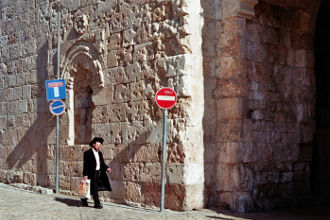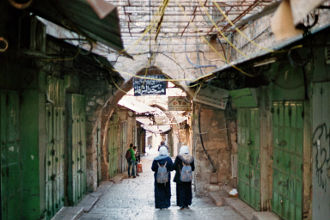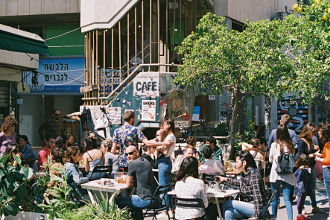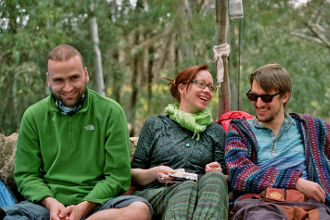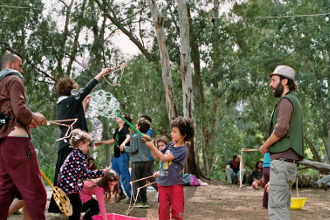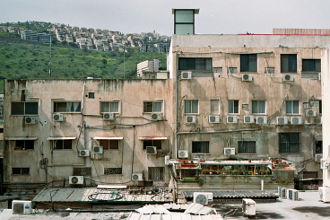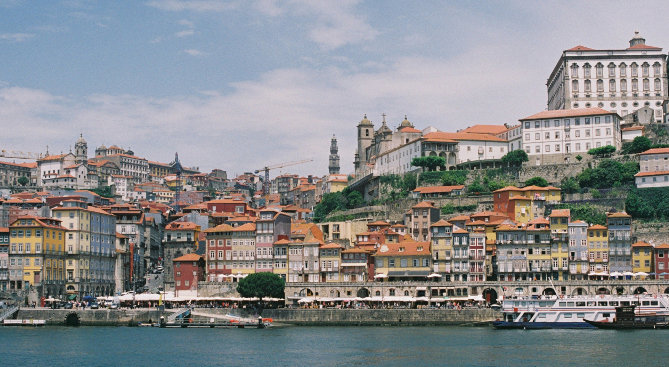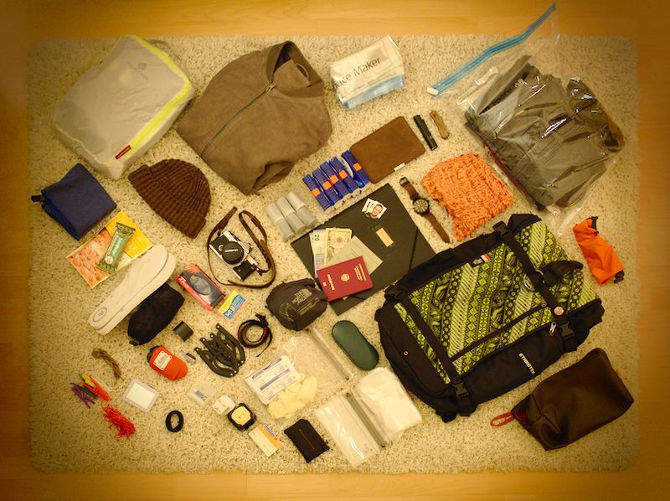For two weeks of March I was backpacking in Israel. I flew there from Berlin and met up with some friends in Tel Aviv. I think this is the shortest vacation I had since a couple of years, but my work life constraints me in these terms now. Still, it was nice to travel again. Being able to float around, staying here and there, talking to people, taking photos, reading books, thinking about stuff.
Israel has been on my travel wishlist since a while now. Such a unique country; I’m never really sure how to grasp the whole Jewish culture. It seems like some mix of culture, religion, country, tribe. And the political situation makes for a very unique mindset of the people and their view on e.g. airport security, life, their country, etc.. If you have the time just read the Wiki article on the Six-Day War, it seems like a story straight out of Hollywood.
One of the things I enjoy most when travelling is to get up early in the morning, walk around in a city, sit down somewhere, get a coffee and breakfast, not doing much, just watching the city wake up for hours and hours, ordering another coffee, maybe read a bit, observe some more…chilling away the entire morning.
In Jerusalem I couldn’t sleep well and woke up very early in the mornings all the time. So I just walked around in the empty old city by myself. On the last day I ended up in the Jewish district at some kind of plaza and stayed there for a while, just watching the city wake up. In Jerusalem the unique thing is that on early mornings many orthodox Jews go to the Western Wall, return home and then go to work. It was somehow nice and calming to just sit there and observe this scenery.
There were some memorable conversations which stand out. One was with a woman of about my age. She studied at about the same time I did. I talked with her about the way the Israeli war with Gaza in 2014 affected her studies at university. The war had a major effect since her exams were always postponed due to attacks and she always started learning anew. That was quite a unique perspective.
The other conversation was with an 18-year old girl at a hippie gathering. She was very, very much full of life. I think I now understand why people tend to age slower when surrounded by young people. When I asked her about what makes up her mind she got quite emotional and talked about making art in order to feel like being alive. The things she said subsequently and that whole manner of having the immediate, very pressing urgency of creating something was a character trait which reminded me a lot of myself a couple of years ago. In the subsequent days I thought a lot about this conversation.
We visited a number of cities, with Tel Aviv standing out to me. What a vibrant city! Full of life! Seems quite similar to Berlin in the summer. Restaurants and bars halfway on the streets with loud non-mainstream music, many young people, alternative vibe, interesting people.
Israel is such a small country and travelling around in the Bus is cheap and easy. Wherever you go, it’s never far. We at most had bus rides of 2-3 hours. We also hitchhiked for a bit, which was really easy (even easier than in Germany). I was surprised by the Sabbath, which is taken quite seriously. Each week, on early Friday afternoon, most shops, restaurants, supermarkets, transportation facilities, etc. close down until Saturday after sundown.
Other stuff which stood out to me was the West Bank. We went to Bethlehem and I was surprised by the height of the wall, it is much higher than the Berlin wall was. And sadly it’s not just a relic of the past there, but rather an active part of everyday life there.
Besides those bigger cities we were also in smaller ones — Clil was a small, laid back town in the North with a focus on sustainable living. The houses there are off the grid and you can buy fresh homegrown vegetables directly from gardens. We did some hiking there and cooked each evening.
We were also in a town near the Sea of Galilee. A guy in the hostel there approached a friend and me, he said we looked like “fresh out of India” and that there was a hippie gathering at a river somewhere nearby. Of course we went there :-). In the past I have been to similar events in Mexico and Guatemala. It was very nice to attend something like this again. Music, families with children, vegan food, community kitchen, nice conversations, easy to talk to people, a place where you can take some time off from the real world out there.
The co-existence of two different cultures in one country is interesting to observe. It is a bit sad though. There seems to be little assimilation or effort to bring the Arab and Jewish culture closer together. In the majority of cases even schools are separated. It seems obvious that it’s hard for adults in both cultures to live peacefully together when they grow up separately from childhood on.
Another city which we visited was Jisr az-Zarqa, a 100% Arab village at the coast (the last Arab village at the Israeli coast). This felt a lot like being back in Morocco. Jisr has one of the highest (if not the highest) school dropout rates in the country (the criminality rate is similarly bad). We stayed in a hostel there and the host had to calculate 5% discount for us. He took a calculator and did this in a very complicated manner with a lot of intermediate results (instead of calculating “price * 0.95”). I guess it’s hard to see the value of education if most of the people you know don’t see it as well. There are few role models with a good education. Timo currently does his Ph.D. in a niche area of realtime systems on the intersection of computer science and electrical engineering. It’s already hard to describe his research to many people in Germany, but to explain what he does to people with such an early school dropout rate would be so alien to their view on the world that I can’t possibly imagine how they could form any understanding of the subject. I think education is really important to enable these people economic independence and reduce criminality and even though there are now a myriad of tools (Wikipedia, Khan Academy, Duolingo, Coursera, etc.) available, the bigger and more underlying problem here might be that people just haven’t learned to see the value of it.
